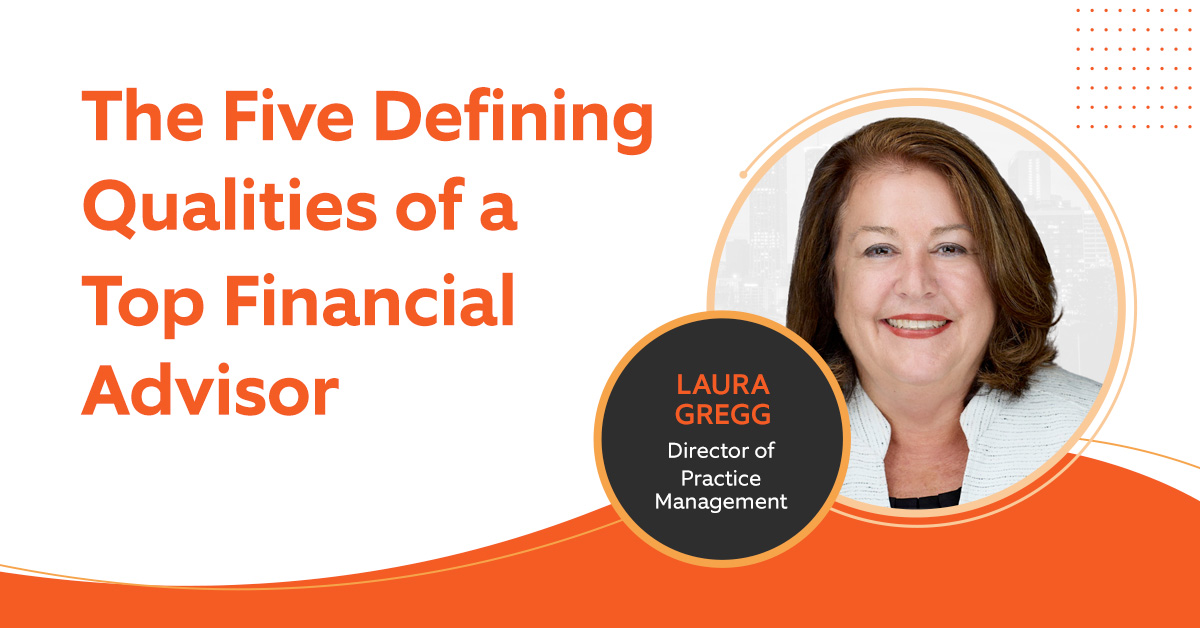As an educator and researcher in the financial advice industry, I’ve spent the past 10+ years learning the in-and-outs of practice management and what makes an advisor successful.
I’ve surveyed thousands of professionals (and their clients) on topics ranging from investment outsourcing to mental health to communication during the pandemic. And for the past several months, I’ve hosted workshops with advisors around the country to explore how they build trust and grow their share of a client’s wallet.
I used to think all advisors followed similar best practices, but there are a few qualities that separate the “good” from the “great.” With so many uncertainties in today’s world – the quality of a financial advisor shouldn’t be one of them. Here’s what I’ve learned about the advisors that make themselves truly indispensable in a client’s life:
They ask the right questions.
It seems pretty obvious, right? But while advisors will routinely engage clients in a conversation about their investment portfolio, if they’re not asking about holistic wealth planning, they’re missing the boat. Superior advisors will help clients identify their blind spots when it comes to other areas of their finances they should be thinking about – do they have the appropriate insurance or long-term care plans? Asking exploratory questions about a client’s short- and long-term non-financial goals or concerns can help deepen a sense of trust and add value to the relationship. To help a client open up, don’t discount the power of open-ended questions. It’s often in the pause or the silence where clients give the most insights into what their concerns are.
“I used to think all advisors followed similar best practices, but there are a few qualities that separate the “good” from the “great.”
– Laura Gregg
They personalize both the conversation and their actions
What works for one client doesn’t always work for another. Advisors who recognize their clients’ personas and the emotions driving their behaviors have a better chance of understanding what clients need to build trust. For example, for clients that are highly risk-averse and reluctant to cede control of their assets to an advisor, it’s all about being patient and building a long-term relationship. Acts of selflessness like offering to help a relative free of charge or waiving a fee for service can really resonate. Other clients may be specifically interested in building a personal connection, but only with the right approach. While relationship-building through invitations to golf or seeing a sports game may work for one client, it may have an adverse effect on another, who may see it as a chance for the advisor to ‘sell them.’
They have the right tools
They make sure no client has to figure out the onboarding process on their own and simply assume they’re getting a high level of service. Advisors need to have a way to ensure nothing gets forgotten – just inputting their client’s information into a CRM system and forgetting about it won’t cut it. I recently spoke with Brad Connors of iWealth. His company provides clients with a web-based list that tracks the myriad details of everything that should be completed to ensure a comprehensive financial plan/life (i.e. tax planning, wills, power of attorney, Social Security, and more). It’s a means to ensure nothing is forgotten and each time the client/advisor meets, they both review what’s been done, what’s outstanding and determine the next steps. So simple, yet integral to creating a better client experience. And it’s only one of many tools out there that advisors have available to get smarter with technology to deepen relationships while enhancing their financial planning processes.
They communicate effectively (and often)
While financial acumen is fundamental, advisors need to go deeper than understanding the numbers. It's about being as transparent as possible, simplifying complex financial concepts, and strengthening their relationships. Advisors need to create a human experience. It’s about the goals beyond the magic retirement number. For instance, in a market downturn, a client may feel they should cancel their dream vacation. An advisor needs to check in with them to let them know whether the plan is still in place (or not). Remind them that you’ve planned for the ups and downs of the market. On the flip side, when the market is roaring, clients may feel empowered to spend too much and outside of their plan. In that case, the conversation is different but nonetheless important.
They know their ideal client
Not every client is going to have the same mindset and relationship style – and that’s okay. There are some clients that will naturally make an advisor feel more fulfilled based on how well their expectations align. With every client persona comes a certain tolerance level. But it’s important to know the types of clients with whom they’ll thrive and when it’s time to call it quits. Advisors shouldn’t pull the plug too quickly. Allow a certain period of time to ‘educate’ clients on the service model the advisor can provide and all the benefits of working within that process. Put milestone dates into the CRM and if they’re not able to flip the client’s mindset after a prescribed amount of time, plan what the off-boarding process looks like. Setting boundaries and prioritizing clients with the most relationship potential can be a valuable path to growth. It can also enhance an advisor’s feeling of fulfillment.
There are perhaps few things more sensitive to people than their wealth, and helping people grow and navigate the challenges of that wealth is no easy task. That’s why I’m committed to serving as a resource and offering tips along the way to help every advisor show up the best they can for themselves and their clients.


